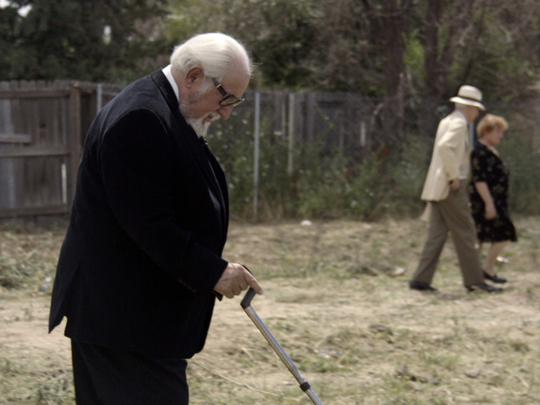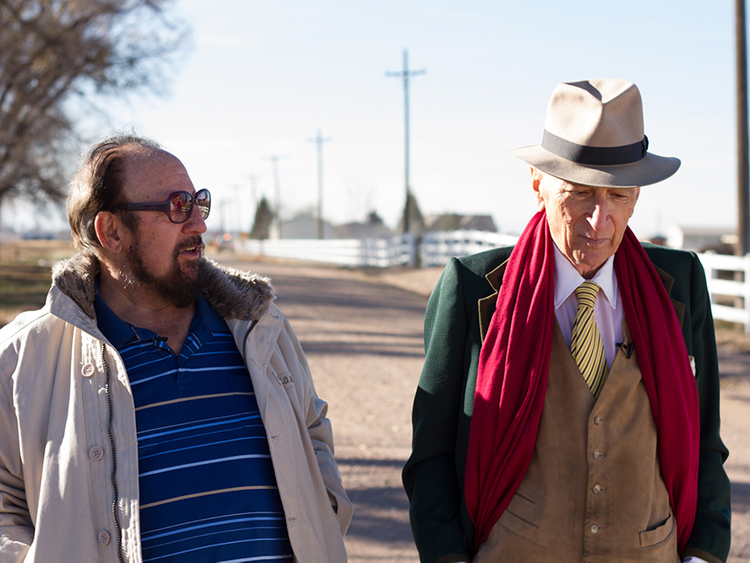
Clad in Mars Blackmon sunglasses and a manicured beard befitting a third-string Bond villain, Gerald Foos is one magnificent creep. Even setting aside his unsettlingly conspiratorial manner of speaking, he looks like the sort of guy who’d purchase a rundown suburban motel for the express purpose of watching its visitors have sex. Which he did.
Over the years, Foos peeped on and enthusiastically masturbated to hundreds of unwitting strangers as they engaged in every coital act under the sun. Because he had kept a detailed log of the activities and used faintly clinical language, Foos was able to rationalise his perversion as academic study. (Never mind that the most groundbreaking insight yielded from his nauseating “research” was that all sorts of people indulge in all sorts of pleasure.) But like any supervillain — and Foos is pretty much Sex Luthor — he couldn’t help a little bragging.
The moment famed journalist Gay Talese confidently declares “he’s not creepy” while discussing Foos early on in Myles Kane and Josh Koury’s fascinating new documentary Voyeur, the seeds of doubt begin to germinate in the viewer. We learn in short order that the real story isn’t Foos’s illustrious career as a Peeping Tom, but rather Talese’s complicated journey to write about it, and the many ethical snags he tripped on along the way.
Foos personally approached Talese with the opportunity to break this extraordinary tale, sensing a kindred in the man who cleaned up sexual deviancy’s reputation years earlier with his daring book Thy Neighbor’s Wife. Talese leapt at the opportunity, as unperturbed by Foos’s gross moral lapses as by Kevin Spacey’s.
Having dedicated his life to the documentation of human behaviour in its most truthful state, Talese was practically jealous of Foos’s untainted conditions. To put it mildly, their dynamic was not conducive to the kind of objective detachment that makes for a responsible profile.
Kane and Koury don’t waste any time weighing Foos’s actions on the scale of judgement; one sound bite from a New Yorker editor calling him a “sociopath” says everything that needs to be said. Of far more interest to them is the slippery interplay between interviewer and subject, a tense negotiation that ought to be a staring contest, if only both men wouldn’t keep blinking. In the present, a straight-faced Talese recalls joining Foos in his “observation deck” shortly after the man contacted him in the early 80s. That this could compromise his integrity as a trustworthy chronicler does not occur to him. By the time that Foos and Talese warmly embrace and agree that they shall remain good friends even after the inevitably scandalous article runs, some rather serious journalistic codes have been violated.
And yet when Talese protests later on in the film that he’s never intended to act as a defender or apologist for Foos, he’s not entirely off base. The man knows the business of writing better than anyone, and often outlines his own motions as he goes through them for the benefit of the folks at home. His trouble isn’t any softening of his sharp intellect, but that he’s grown out of joint with the modern world around him. At 84, Talese is the sort of bon vivant produced by a mid-century New York that no longer exists. He never allows himself to be seen without an immaculately tailored suit, usually complete with a pocket square or fedora. (So complete is his fixation on fashion that he requests the normally shabby Foos dress to the nines whenever they meet.) The directors first introduce him in the plush isolation of his luxuriously appointed brownstone, following him into the converted wine cellar he’s repurposed as a subterranean writing bunker. As naturally occurring symbols go, it’s damn near perfect.
That sumptuous detail is just one of the subtly integrated authorial touches from Kaury and Kane that keep the ship steady as it navigates stormy textual waters. At any given moment, it might look like Talese is manipulating Foos, or vice versa, or both, or that the men are jointly constructing a different account than the one the film’s showing. Everyone’s at cross purposes, the subjects’ words as loaded with unspoken intent as the directors’ damning comparative edits.
In the most electrifying moment, Talese intercepts a question directed at Foos and excoriates the documentarians for what he clocks as dishonest reportage technique. Talese calls out the directors for trying to trick Foos into speaking hypocritically, and in doing so, casting doubt on himself and his testimony. He’s not wrong — that’s exactly what they’re trying to do — but it’s also what the situation calls for. In a tangled nest of half-truth and outright lies, Kaury and Kane grasp for one bit of honesty, even if that’s an honesty about fakeness. It’s Talese who can’t handle the truth.
___
Don’t miss it
Voyeur is now streaming on Netflix.










